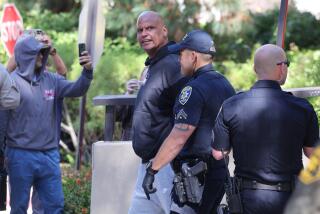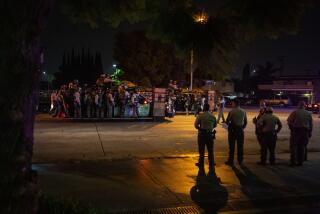Soviets Detained U.S. Observer, Weinberger Says
- Share via
WASHINGTON — Soviet troops deliberately rammed the truck of an American military observer in East Germany earlier this month and then held him at gunpoint for nine hours, Defense Secretary Caspar W. Weinberger charged Sunday.
A Pentagon spokesman later said the incident involved a two-person team in an unrestricted area near Suhl-Finisterberg, about 175 miles southwest of Berlin, near the West German border and close to the site of a Soviet communications unit. He said neither of the two, whom he declined to identify, were hurt.
Weinberger said the United States has protested the Soviet action, which he described as the “third or fourth” such incident involving members of the U.S. Military Liaison Mission headquartered in Potsdam near East Berlin.
In the most serious of the confrontations, U.S. Army Maj. Arthur D. Nicholson Jr. was shot and killed last March by a Soviet sentry while the American was on official duty. The Soviet government asserted that Nicholson had been trying to take photographs inside a restricted Soviet military installation 80 miles northwest of Berlin when he was shot, an allegation denied by American officials.
Administration officials made a point of publicizing the Nicholson affair and discussed it in great detail at the time.
In contrast, Weinberger offered few details of the latest attack and, although critical of Soviet actions, seemed restrained in discussing it during an appearance on CBS’ “Face the Nation.” He mentioned it only under questioning in confirming a CBS News report of the incident.
However, Pentagon spokesman Robert B. Sims later provided some details of the incident. He said it occurred Sept. 7 when the two-member team’s truck stalled, apparently when it became entangled in some wire as it was leaving the Suhl-Finisterberg area.
“As they tried to get the vehicle out of that location, a Soviet truck approached at high speed and hit the U.S. vehicle,” Sims said. “At that point, the Soviets surrounded our vehicle, directing the U.S. personnel to stay inside.”
He said a Soviet officer arrived several hours later and interrogated the two Americans. The Soviets, he said, then towed the vehicle “to a different area.”
“Then the (U.S.) crew worked on the vehicle for more than two hours” before they were able to return to their headquarters,” Sims said.
Sims insisted that the site of the incident was not in any permanent or restricted area, indicating that the teams was operating within the limits of a postwar agreement.
The United States, Britain and France base military observers in East Germany, and the Soviet Union is allowed to place similar observers in West Germany under a 38-year-old pact left as a legacy of the occupation years after World War II. Despite East-West tensions, the pact allows observers to conduct limited intelligence-gathering activities, a practice often referred to by intelligence officials as “licensed spying.”
Weinberger denied that the Administration is taking a low-key approach to the incident to avoid poisoning the atmosphere for the scheduled November summit between President Reagan and Soviet leader Mikhail S. Gorbachev. He said the incident will not affect the summit meeting.
Still, an unnamed Reagan Administration official quoted by the Associated Press said Weinberger may have “overdramatized” the incident.
The official said that when a Soviet commander belatedly came to the scene--blaming his delay on getting lost--he ordered his troops to disentangle the truck.
“The Soviet commander apologized profusely,” the official said.
Weinberger said the incident occurred “a few days ago,” but did not give the name or rank of the American involved or where it took place. He spoke of only one American, presumably the observer, with the second man apparently being the driver.
“It’s a continuing series of episodes,” he added. “We have had promises by the Soviets that they would tell their people not to use force, and either they’re not keeping those promises, or they have a very poorly disciplined unit.”
More to Read
Sign up for Essential California
The most important California stories and recommendations in your inbox every morning.
You may occasionally receive promotional content from the Los Angeles Times.













